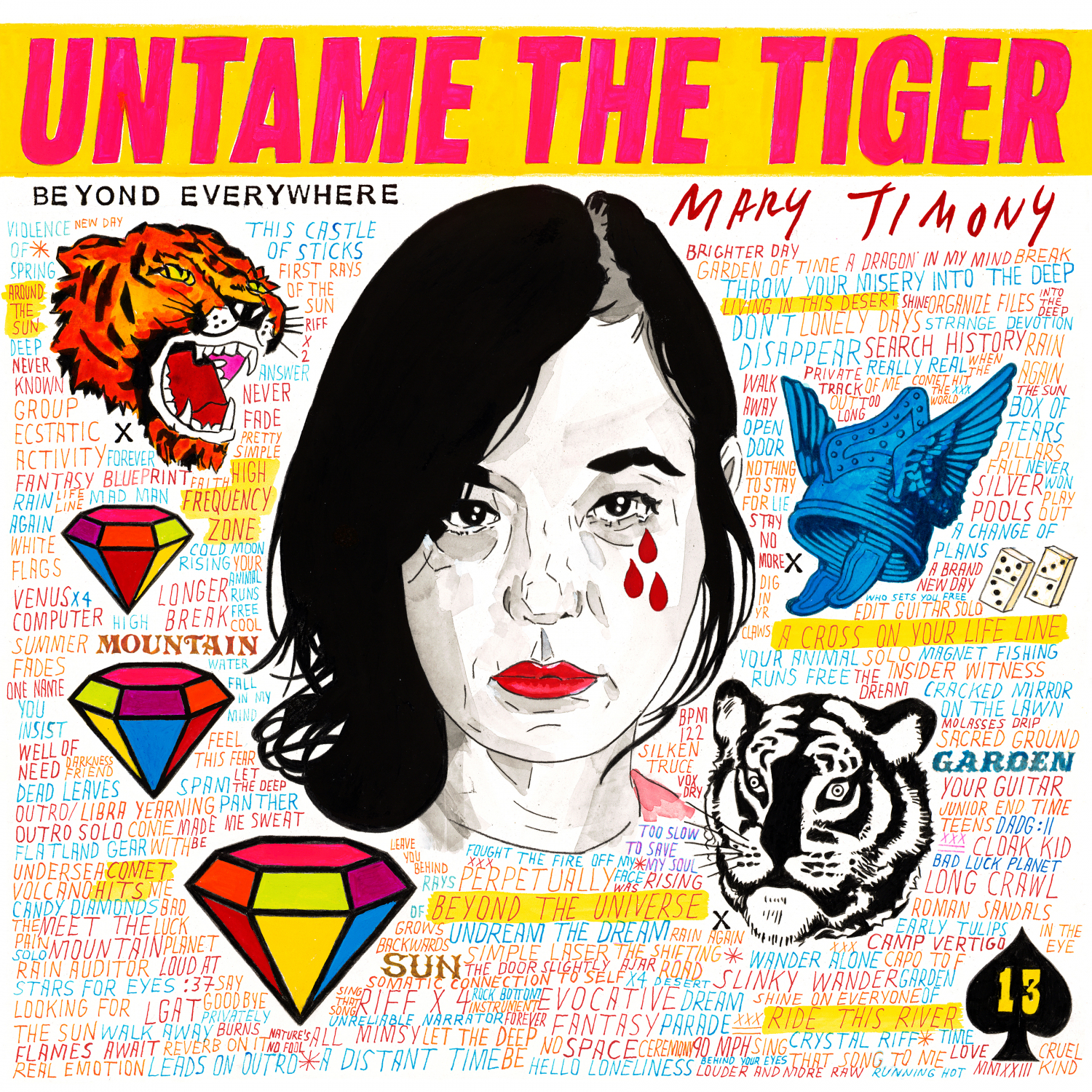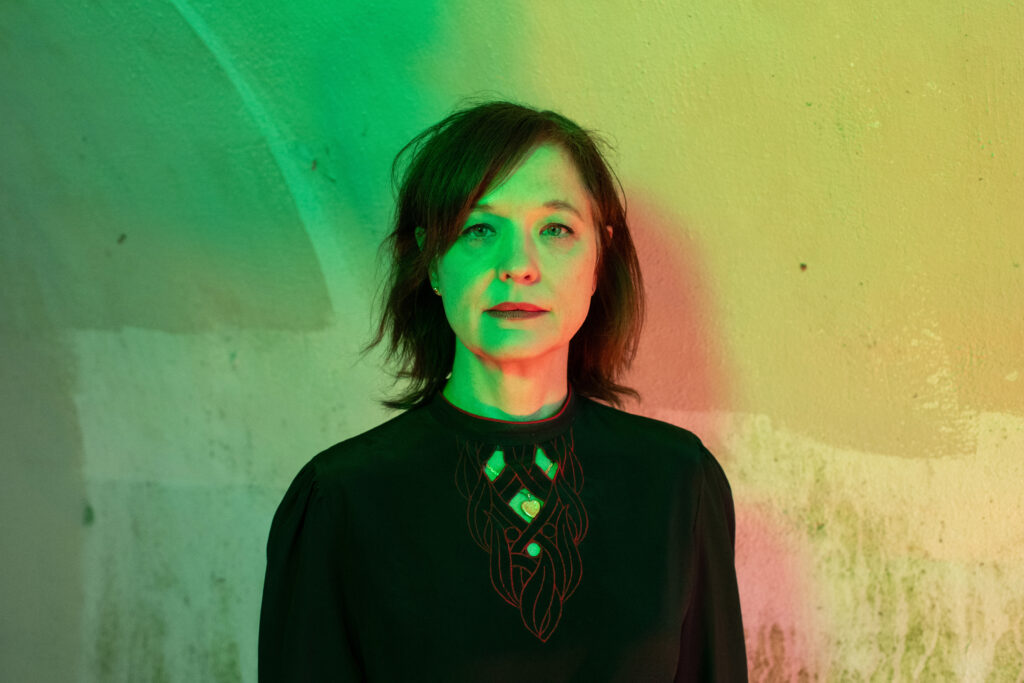
The Guest List is a regular book column that surveys the reading habits of our favorite musicians. In this edition, Jimmy Cajoleas talks with Mary Timony, the indie-rock legend whose resume includes Helium, Wild Flag, and Ex Hex. Her new solo album, Untame the Tiger, is out now from Merge Records.
Jimmy Cajoleas: What are you reading right now?

Mary Timony: I just started this biography of Sun Ra called Space Is the Place: The Lives and Times of Sun Ra by John Szwed. Before that, I read a novel called The Death of the Heart by Elizabeth Bowen, about a girl in London in the 1930s. I have this thing where when I read, I like escaping a little bit. I like to read older things, like nineteenth-century English literature, because that’s what I did in college. I like escaping back to that time.
JC: I go back to the nineteenth-century novelists a lot too. I’m starting to think they truly figured the novel out then, and they established all the rules. It’s when the traditional form of the novel might have peaked. They’re such amazing storytellers.
MT: Like who?
JC: I recently reread Henry James’s Portrait of a Lady and it completely blew me away.
MT: Yes! I loved Washington Square too. Henry James is amazing. That makes so much sense that that was the golden age of the novel. They were still making up the rules, getting them together, not deconstructing them yet. I remember when I was younger, deciding that I wanted to read William Makepeace Thackeray and being amazed at how he had such a different way to tell a story than the books I was used to. I’ve read the Jane Austen novels obsessively, and I still really love Charles Dickens. That’s my comfort stuff. I love that shit.
JC: Are there any books that inspired the writing on your new record or that you were reading during the recording?
MT: One of the books that directly influenced my new record was this book called Songwriters on Songwriting by Paul Zollo, which is a collection of interviews with all the greats. It’s got interviews with Neil Young and Neil Diamond and Joni Mitchell and Pete Seeger and everybody you could imagine from the ’60s and ’70s. Hearing these people talk about their creative process was very inspiring. If I were to name one book that directly helped me, I would say that.
Both of my parents were sick while I was writing these songs. My dad had dementia, and what we did together in that time became a huge influence on the record as well. He wasn’t a musician or anything like that. He was a judge. But when my dad got sick at the end of his life, he became obsessed with music, which had never happened before. He asked me one day, “Mary, who is the greatest poet of Canada?” I finally realized he was talking about Leonard Cohen. Somewhere in the back of his mind he had this memory of hearing Leonard Cohen a long time ago. So I got him this box set of Leonard Cohen’s music, and he became absolutely focused on Leonard Cohen. Listening to him became my dad’s main activity for a year.
As he got sicker, my dad got fixated on only three things. He liked this one song by Leonard Cohen called “Dance Me to the End of Love.” That’s a song that he wrote about people in concentration camps contemplating death, and it made so much sense that my dad got fixated on those lyrics. We printed out the lyrics and would sing them together and listen to the song I don’t know how many times a day. He would scream-sing along, or I would give him the lyrics and he would read them out loud. It was the same thing with that Bob Dylan song “I Dreamed I Saw St. Augustine,” which is a really mysterious one. I printed those lyrics out and we would read them together.
And the last thing my dad got really into was the poem “The Lake Isle of Innisfree” by W. B. Yeats. Every time I would go to see him, he would try to get up, and he would start reciting that poem and I would say it along with him. Somehow that part of his brain was still remembering, and that was what he wanted. Those three things I would hear a lot, so they filtered their way into my work. I would never say I was consciously trying to write lyrics like Yeats—I’m not that pompous or whatever—but I’m sure they influenced me somehow because I was hearing them all the time. All three of those songs and poems are about traveling beyond, and I think they comforted him.
JC: Do you have any all-time favorite books you return to?
MT: We already talked about some of those, but I really love Franz Kafka. I think he’s my favorite writer of all time. I love the Brontës too. At one point I was really obsessed with The Diary of Samuel Pepys, from the 1600s. I like old diaries a lot. Reading them is like time travel, and it’s the closest we’ll ever come to knowing what life was like in a different time period. Samuel Pepys is really interesting to me because he’s so precise about whatever he did that day. If you were reading the book whenever he wrote it, you’d probably think it was the most boring thing you’d ever read. Because he’s like, Here’s what I ate for lunch, and then I went to a play. But it’s fascinating, because he’ll talk about how that night he ate partridges and turtles for dinner. And he’ll describe the Great Fire of London, and you learn about how the people back then dealt with fires. And then, you know, the Plague happened. It’s all fascinating to me. The diary has no plot or anything. It’s just life as it was lived.
Another one I love is this diary by Margaret Fountaine called Love among the Butterflies. It’s about her travels around world, collecting butterflies, during the 1800s and early 1900s. She was kind of a badass, a woman alone, traveling around, collecting her butterflies, which was something frowned upon for a woman to do back then. It was really inspiring to me. I found it in a used bookstore, and it has stayed with me forever. That’s my favorite way of getting books, going through a used bookstore and finding something unexpected.
JC: It feels like there’s been a concerted effort in the last twenty years, through the internet and streaming and whatever else, to get rid of browsing in real life.
MT: Totally. I love browsing for things in general. Doesn’t really matter what it is. Having happy accidents. That’s just how my brain works. I did so much book browsing in the library as a little kid, reading the first page of whatever stuck out. It’s such a great feeling when something grabs you and you find this amazing thing that’s interesting. It’s the same thing with finding records that are cool. I love happening upon this private little something that’s all your own.
JC: You’ve already mentioned some, but are there any other music books you’d like to recommend?
MT: I only like reading about musicians when I really love them. I have friends that will read any music biography, because they find reading about the lives of musicians interesting, but that’s not me. I did really like the Richard Thompson memoir called Beeswing: Losing My Way and Finding My Voice 1967–1975. I love Richard Thompson. I think he’s incredible. I enjoyed Viv Albertine’s book Clothes, Clothes, Clothes. Music, Music, Music. Boys, Boys, Boys. I love her and I thought it was really entertaining. I just got this book that my friend Audrey Golden wrote called I Thought I Heard You Speak: Women at Factory Records. I’m excited about that one. Another friend, Tom Beaujour, wrote this book called Nöthin’ But a Good Time: The Uncensored History of the ’80s Hard Rock Explosion. It should be pretty fun. It’s got interviews with lots of ’80s heavy metal bands.
JC: Any other books you’d like to mention?
MT: I got into this vortex where I was on tour and I was really sick of being on tour, and for some reason I got into reading memoirs by people who had escaped from North Korea. For about six months I would read every one I could find. They’re fascinating! What is going on in that country is so insane, all this stuff that we don’t really know and it’s all so bad. The shit people go through to get out of there is crazy. There’s one called Nothing to Envy: Ordinary Lives in North Korea by Barbara Demick and another called The Aquariums of Pyongyang: Ten Years in the North Korean Gulag by Kang Chol-hwan. I couldn’t stop reading those. I found it pretty inspiring, how hard they worked to get out of there, how persecuted they were, and how poor, and they still found a way out. It makes me appreciate my own life, and how easy we have it here. It’s all just really fascinating.
Jimmy Cajoleas was born in Jackson, Mississippi. He lives in New York.
